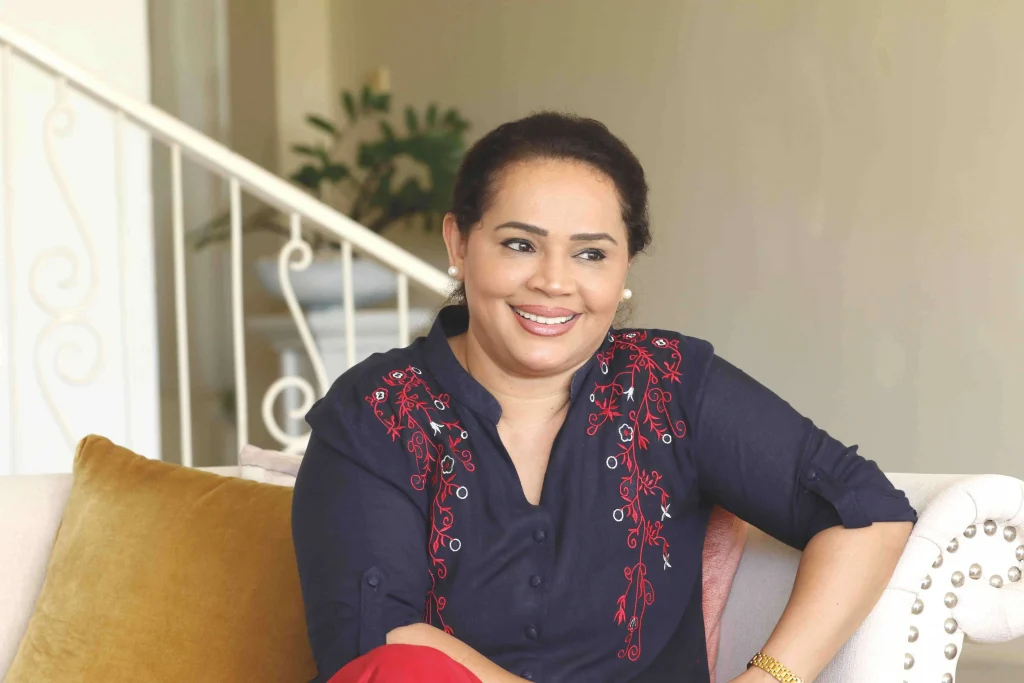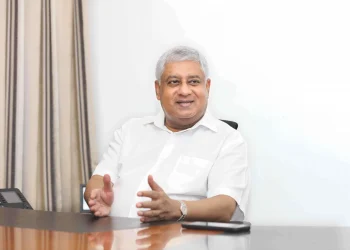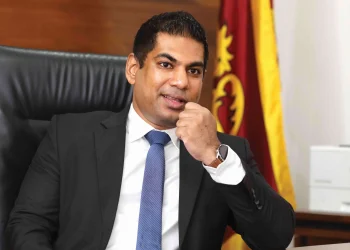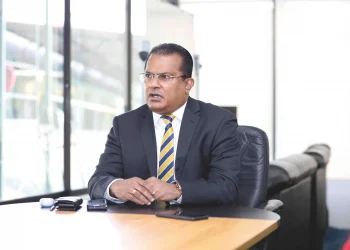She’s not in it for the money, says State Minister for Tourism Diana Gamage. Ridiculed and vilified for her views and the subject of countless memes and YouTube analysis Diana Gamage is undaunted and formidable. She says politics is not her livelihood but indeed runs in her. She doesn’t earn from politics or intends to make money. She is instead using the platform to drive her development agenda for Sri Lanka. Nothing stops her from pursuing her goals, feistily stating that this time she aims to develop the country and help bring it out of its economic morass. Strong and determined, it’s in her to finish anything that’s undertaken. She’s never far from the news, from spurning her party to vote for the 20th Amendment to fighting her suspension Diana Gamage remains unbowed. She’s also made a name for one of the most infamous reasons, her call to legalize cannabis, an incessant litany that she keeps chanting in parliament. Her point about legalizing cannabis for medical and industrial purposes made sense, where she had a lot to say about what we need to put right in a country that has wandered off the mark. From a vision to develop tourism through a night economy to leveraging the beautiful places in Sri Lanka, Diana Gamage proclaims to be for the people and with the people. It doesn’t matter whether she receives the people’s mandate to serve again, but she says the people will be the “poorer for it.”
Words: Jennifer Paldano Goonewardane.
Photography: Sujith Heenatigala and Dinesh Fernando.
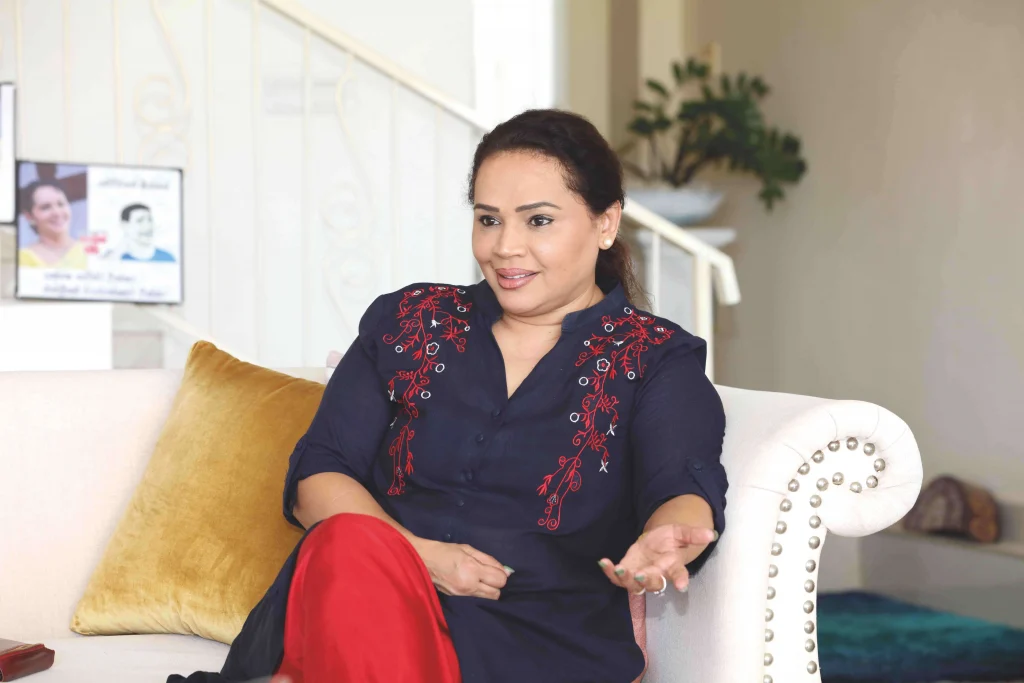
Who is Diana Gamage?
I am the most criticized person in Sri Lanka because of my radical and out-of-the-box thinking. I was born to a British mother and a Sri Lankan father. My father was from Kekanadura in Matara. My paternal family history has profound Buddhist roots. For instance, Parawahera Sri Vajiragnana Thero was my grandfather, the vice-chancellor of Sri Jayawardena Pura University. His temple was the renowned Padhanaghara Temple in Maradana. His brother was Parawahera Rewatha Thero, who built the Weherahena Temple in Matara.
My mother has a history with Sri Lanka. Her father, a British Army officer, served in Sri Lanka during the Second World War, and my grandmother is half-Irish and Dutch. My grandmother’s uncle ran the East-West shipping in Sri Lanka. So as you can see, my mother’s family has ties to Sri Lanka.
I was born in Sri Lanka. I studied up to the GCE Ordinary Level. Then I went to London, where I pursued my education, completed my Ordinary Level and Advanced Level examinations, studied psychology and business finance, and completed my LLB and MBA.
Although I lived in England, I hadn’t forgotten Sri Lanka. I used to think a lot about my country. My mind was always in Sri Lanka, as I consider it my home and motherland. I always wanted to return and do something for the land of my birth. I returned in 2001; since then, I’ve traveled extensively. Before that, I had been in and out of Sri Lanka but settled permanently in 2001. Since then, I have researched the issues faced by people in various parts of the country. I have been asking questions like why we are still a third-world country and why aren’t we able to move forward from where we are right now. Thirty years of war didn’t help in the country’s forward march. I believe that the war resulted from our leaders’ selfish decisions in the past, leading to a thirty-year conflict that has cost the country dearly. It has cost Sri Lanka 200 billion US$. We can never regain what we have lost in the war. During my visits to the northeast, I’ve met many war widows and studied the issues they face. Having traveled, spoken to people, and understood the problems people in different contexts were grappling with, I launched my social welfare projects and counseling for women and families.
I’m a very compassionate person. I am strong and determined. When I set my mind to something, I want it completed. That being my personality, I realized that I could do much for Sri Lanka. I also realized that many things in Sri Lanka are politicized. I listen and can grasp anything. I know much is being said about me these days. That doesn’t bother me because I’m open-minded and think outside the box.
You have spoken a lot about what you want to do to bring dollars to the country. How long do you think it will take for your dream projects to come to fruition in the current situation?
Mannar and Kalpitiya have been the focus of tourism promotion in the past, but very limitedly. But somewhere along the line, those projects have stopped. I plan to look into them. People often misconstrue the idea when I speak about promoting nightlife in Sri Lanka. My idea of nightlife is to establish a night economy. Globally there is a day economy and a night economy that function in many countries. Although Sri Lanka has a day economy, we don’t have a night economy. Any country that fails to leverage the benefits of a night economy cannot survive and make a good profit. The day economy is what you and I do during the day, working in our offices and engaging in business. The night economy is to spend what we earn in the day. People should have the space to spend what they make in a vibrant night economy. An economy doesn’t benefit when the money people earn during the day doesn’t get circulated. People who travel to Sri Lanka for work and business and as tourists find their activity choices limited even during the day. Moreover, how much can they spend during the day? Is it good enough to generate an income from the fee that tourists and foreigners pay at heritage sites and other attractions?
Night time is when people look forward to getting out and spending time at bars, restaurants, and other hangouts. Suppose we fail to provide people the space they desire by creating a night economy. In that case, the country will not get the money earned during the day because even the locals with the wherewithal to spend in a night economy will convert their rupees to dollars to spend abroad because they want to enjoy and have fun. Even Colombo being the commercial capital, is bare after 10pm. Even before COVID-19, Colombo or any other part of the country was devoid of vibrant nightlife. A hotel or restaurant will tell you that their last order is served by 10.30pm because they put down shutters by 11pm. Whereas in other countries people step out of their hotels after 9pm. Here bars aren’t open till late, forcing patrons to cut short their relaxation time. That has to change to make way for Sri Lanka to earn the desperately needed money.
We shouldn’t confine the night economy to Colombo. We need to have a night economy in leading resort towns frequented by tourists. Night clubs and bars should be open to entertain anyone who wants to stay out till late. There should be food stalls and space for shopping if that’s what people want. Our options are numerous if we think out of the box.
People often misconstrue the idea when I speak about promoting nightlife in Sri Lanka. My idea of nightlife is to establish a night economy. Globally there is a day economy and a night economy that function in many countries. Although Sri Lanka has a day economy, we don’t have a night economy.
While we promote the night economy, shouldn’t it go hand in hand with infrastructure, safety, and security where it becomes a coordinated effort of many agencies?
I endorse that view. We must ensure the safety and security of tourists and locals when they are out at night. Everyone should feel safe outside at night. Providing a safe environment should be our utmost priority. It’s the government’s responsibility to ensure a safe and secure environment for people to travel and walkabout. We know what tourists have to endure in Sri Lanka. There have been several unpleasant occurrences in resort towns that we cannot ignore. First, the country should prepare its Police force to deal with tourist-related incidences, mainly to deal with them sensitively and appropriately. We have to accept that there’s a problem regarding public security that requires addressing. I plan to address this issue going forward. We may have a Tourist Police, but they need comprehensive training in dealing with tourists’ complaints. First and foremost, we must put the house in order.
Don’t you think the service providers in various sectors, too, must interact appropriately with visitors?
Service providers also require training in providing efficient and quality service. The popular belief is that Sri Lankans are friendly and hospitable, which we must prove in practice, especially by the hotel staff.
Our hospitality must begin at the airport, the first point of contact, where we create impressions. Immigration officers must receive training from time to time on handling people arriving, which I suggest should be at least once in six months, and a separate team of officers to deal with tourists. We must train them to speak to people politely. They have to be firm and friendly. Sri Lanka can’t afford to be rude because we need visitors as they bring the dollars. I speak with experience. They asked my son, a British passport holder, who his parents were. Is that relevant? Is that the type of question we ask an individual arriving in Sri Lanka? They ask irrelevant and silly questions, which is why they require training. While there are efficient and polite officers who do their duty well, I wonder whether it’s stress or mood changes that make them behave that way. I have identified the shortcomings and made proposals on where we require change. I’ve suggested to the Minister of Airport and Aviation Services to introduce counters for foreign passport holders, first class, and business class travelers as they’re paying a premium price.
Our overseas diplomatic missions can do a lot to promote tourism, trade, and investment. I have given former president Gotabaya Rajapaksa and now Ranil Wickremesinghe a proposal to use the office of our diplomatic missions to promote tourism and investment by giving them revenue targets for the country. What are the trade desks in our foreign missions doing? They are not promoting tourism or trade. An embassy or high commission would be the first point an outsider would access to obtain information that should be readily available. Investment promotion also should be high on their agenda. However, I see top positions in diplomatic missions gleefully enjoying the privileges of office while the public pays for it.
It’s the media’s duty to use their platform to promote the country, especially at a time like this when positive news will help attract people into the country. We need change. The system change that the country requires is a change in attitudes and mindsets.
Do you think our hotels are up to industry standards to cater to a diverse clientele?
We are yet to target retirees and senior citizens in Europe and other countries with the money and love to explore the world. But do we have adequate facilities to fulfill their requirements? Have we focused on catering to the differently abled and people with special needs? We call ourselves a paradise, but we’re a dead paradise after 10pm. A paradise should operate 24/7 and provide facilities to a diverse crowd of visitors.
Sri Lanka has 40,000 rooms. I’m studying how many can cater to people with special needs and whether those hotels fulfill accessibility requirements. We should focus on aspects that cater to people of different age groups. Senior citizens, for instance, may need a special caregiver as a guide, given their dynamic needs. Retirees may require the assistance of trained care workers. We should focus on attracting retirees to Sri Lanka because they have money to spend. Unfortunately, we’re yet to do it.
Moreover, on the downside, Sri Lanka tourism is yet to reach out to the Scandinavian countries. We must do more to take Sri Lanka to the world. We must promote Sri Lanka in Africa, Trinidad, Jamaica, Seychelles, and the Dominican Republic, regarded as tourist hotspots.
Don’t you think there’s a disconnect in the working relationship between the Tourism Ministry, the Bureau, other relevant agencies, and stakeholders in the industry in prioritizing tourism promotion? In the future, how do you think we could achieve that synergy? Today Sri Lanka is declared bankrupt. We’re in a do-or-die situation that we have never faced before. We are facing a massive forex crisis. However, we are yet to think of a strategy to earn dollars for the country. Hitherto we have been making our dollars from tourism, migrant workers, and exports. Other than those, what else do we have to generate forex for the country?
I agree that there’s a lack of communication between agencies. People have been merely doing their job. Top people in the industry have failed to deliver. They don’t receive targets, so we are where we are. I can confidently say that 80 percent of the government workforce doesn’t work. They are neither efficient nor competent. So, why are we surprised that Sri Lanka is bankrupt today? Bad decision-making and bad management in the past have led us to a spiraling decline.
In addition, some elements create issues by stirring people’s sentiments to thwart growth and development. Those elements purportedly use culture and religion as a rallying call to stop the country’s development. They are mixing the personal with the public, and I believe that religion should be confined to the private domain and shouldn’t hinder growth. Of course, we should be mindful of safeguarding culture. However, the culture we speak so highly of is not what it was a thousand years ago during the time of kings. The kings had nightlife too. The culture of a thousand years approved of a king having hundreds of concubines and a harem. If that’s the culture we want today, then you and I would be walking topless, but haven’t we already moved way ahead of that lifestyle? As a nation, we’re still living in the past. I am tired of patriotism and its duplicity at the hands of some elements.
Speaking of patriotism, isn’t it a slogan that politicians have manipulated cleverly to stay relevant among the people?
Absolutely. We have been trying for a very long time to attract investors. Many come but don’t return because they face many barriers. Patriotic elements declare that the government is selling the country’s assets and resources to foreigners. They fail to distinguish between investment and surreptitiously selling resources to outsiders. Incessant protests hampered many investors in the past. I suppose those patriotic elements are happy now that the country is bankrupt.
Today who would take the risk of investing in a bankrupt country? Sri Lanka is in a catch-22 situation. We have to pay for commodities but aren’t getting adequate dollars to cover the cost. The other drawback I see as a nation is our failure to develop manufacturing locally. We have abandoned our manufacturing culture and industries. Since the opening of the economy in 1977, we’ve become lazy as a nation to manufacture. Instead, we spend dollars to import our necessities. We’re paying a 52 percent tax for sanitary towels because we’re importing them. We can undoubtedly manufacture them locally. I know some companies are making them now, and I intend to promote them. I’m discussing with several companies and investors to start manufacturing sanitary towels locally. I can’t imagine why we haven’t done it for this long.
Don’t you think all political parties across the divide are guilty of stymying investments? Because their behavior in power and Opposition differs.
We’re in a sinking ship. Unless we do something together, the people will go down with the sinking ship. The rich, of course, will leave the country. At Sri Lanka’s worst juncture, all political parties must unite first as citizens to redeem the country from its abyss. We may be in Parliament representing the people, but we’re still part of the citizenry and responsible for the country. Political differences and fighting can’t happen now. The need of the hour is to unite for the country’s sake.
You had met with many diplomats who had pledged their country’s support to develop the tourism sector in Sri Lanka. What kind of a response you received?
I have spoken to many ambassadors and high commissioners in Sri Lanka about promoting our tourism in their countries. They have responded positively and pledged their support for Sri Lanka as a place to visit. On our part, we must show the world that Sri Lanka is a safe place to travel. We must also invest in improving our image. The media has the wherewithal, the space, and the presence to take Sri Lanka to the world in a positive way. However, they’re not helping the country when they continue to show only the negative news. Even after the queues are gone, some media outlets continue to show past events and take pleasure in doing so. When they telecast past events over and over, foreign media outlets pick them, which obviously would discourage foreigners from traveling to Sri Lanka.
We wouldn’t see that happening elsewhere. It’s the media’s duty to use their platform to promote the country, especially at a time like this when positive news will help attract people into the country. We need change. The system change that the country requires is a change in attitudes and mindsets.
You have been upbeat about developing Mannar into a tourist hotspot. However, we’ve always seen local people rising against potential development projects, and it’s the same with Mannar, where your proposals seemed to have already ruffled a few feathers.
People become comfortable in a certain way of life and fail to see the long-term benefits of change. They don’t realize that change is about developing them and the next generation, the benefits of which would also accrue to future generations. Of course, we must be sensitive to their way of life and values and culture, and their local businesses and economy. I haven’t suggested that we take over Mannar and dispossess the people.
Whatever we undertake to do in Mannar will be done in consultation with all the stakeholders, including the lawmakers representing the district in Parliament. One has to sit with the locals to identify their development needs. People who already have a livelihood in Mannar will not lose them but will see an improvement in them. We can develop the islands around Mannar and Kalpitiya similar to what the Maldives has done with theirs. Doing so will benefit the youth and children of those areas who will have access to better jobs and improved incomes. There’ll be better education for children and empowerment for women. Women can dry fish which they’ve been doing, and still have a micro business. People always get the wrong end of the stick when I say something.
No one wants to invest in Sri Lanka, but if we legalize cannabis for the purposes I’ve mentioned, there’s a 500-million-dollar investment for 2023. We may be economically bankrupt, but we still have the privilege of a tropical climate and fertile soil that allows us to harness their potential to come out of this current crisis.
You have to raise your voice whenever you speak in Parliament, and you seem frustrated. Given that you have very ambitious plans for the country, why isn’t the Government that you serve not responding? Is it because you’re a woman?
Every time I speak in Parliament, I feel frustrated because the more I try to convey my thoughts and plans, the more they try to stifle me with their negativity, knowing that I am talking about the truth. They ridicule me because I’m a woman claiming that I speak rubbish.
While we’re a patriarchal society, 52 percent of the population are women, of which 56 percent of women vote to elect leaders. While that’s good enough for the men in Parliament, they find a woman expressing her radical views and thinking outside the box a threat. However, outside, those very men appreciate my proposals. My frustration is with the failure to do anything or nothing about my suggestions for the country’s development. That doesn’t mean that I’m going to give up.
I speak from the heart. I talk about reality and hence my tone. In addition, with minimal time in Parliament to speak, we have to say what we have to very quickly as everything that’s said goes into the Hansard, and stopping halfway wouldn’t make sense when printed.
Didn’t you have issues with your party after voting for the 20th Amendment?
I entered Parliament in August 2020 and voted for the 20th Amendment in October 2020, after which the SJB suspended me. The SJB belongs to my husband and me. I supported the 20th Amendment and the then Government to ensure that something good would come about for the people and the country through a strong executive. I believed then that the 20th Amendment would pave the way for the country’s development. People accused me of supporting the Government to get a ministerial portfolio, but I wasn’t given a portfolio until April 2022, when I was made the state minister for transport. We gave our party to Sajith Premadasa and appointed him as its leader, and I stepped down to allow Ranjith Maddumabandara to take up the post of general secretary. Since then, I’ve had issues with a case pending in the Supreme Court over my suspension, as they did not do it following a disciplinary inquiry.
You have promoted industrial and medical cannabis to bring much-needed forex to Sri Lanka. But you have been ridiculed and criticized. Can you tell us the rationale behind your persistence?
I have been speaking about legalizing cannabis since November 2020. In 1961 the WHO banned cannabis as a dangerous drug while we were using it to make Ayurveda medicines. The British banned its use in Sri Lanka in the 19th century. In 1961 Kirielle Gnanawimala Thero fought against the ban as cannabis is an invaluable medicine. But since we had to follow WHO guidelines, we went ahead with the ban. Subsequently, the WHO realized that cannabis, after all, is not dangerous; in December 2020, the WHO delisted it as a dangerous drug. Unfortunately, Sri Lanka is yet to delist it as a dangerous drug.
When I began expressing my thoughts on the uses of cannabis, the men in Parliament were stunned. They said I couldn’t speak on such things. Why? Because I’m a woman. But I didn’t care. I haven’t given up, and I will not stop talking. I will not give up on promoting cannabis for investment until I get it done. My Government didn’t want to move forward with my suggestions. They could’ve researched its viability. Gotabaya Rajapaksa was in favor of it because many Buddhist monks had echoed my sentiments that cannabis has medicinal properties and is something used since ancient times. The Government handed over the role to the Ministry of Indigenous Medicine to submit a paper following a study of cannabis. However, they are yet to consult the individual who proposed the revival of cannabis cultivation to find out what I was referring to when I suggested the reintroduction of cannabis cultivation. I’m talking about industrial hemp and medical cannabis.
I’m not referring to the use of cannabis in Ayurveda because it’s legal to use it in Ayurveda, where the Ayurveda Commissioner has the right to cultivate a certain amount of cannabis for medicinal uses. There’s nothing new in that. I’m referring to encouraging an industry in cannabis that extracts CBD oil used globally for ailments such as cancer, arthritis, anxiety, and multiple sclerosis. Even children get to use medical cannabis. Industrial hemp is harmless and used in various cosmetics and sanitary products, such as creams, shampoos, and toothpaste, freely available in supermarkets worldwide. You’ll find industrial hemp in textiles, rope, paper, paint, and food. Just imagine the business and job opportunities that industrial hemp could bring. Following its legalization, Thailand had a trade exhibition in August to showcase the range of products made from industrial hemp, attracting 2.2 million visitors. CBD oil can be processed and exported. We can manufacture products locally that use industrial hemp for the export market. So far, 52 countries have legalized cannabis cultivation. Gujarat in India is growing it legally. Rwanda and Malawi have started recently. I spoke with a Malawian who said they’ll be manufacturing a medical cannabis-based capsule for cancer. Imagine the money that Sri Lanka could generate through legalizing cannabis. People are freely smoking nicotine-filled cigarettes, which are harmful but legal. What about the use of drugs in Sri Lanka, which is circulating among young people? Countries that legalized recreational cannabis have found a 50 percent reduction in the use of hardcore drugs.
Do you think it will be a reality in Sri Lanka?
It must be a reality. No one wants to invest in Sri Lanka, but if we legalize cannabis for the purposes I’ve mentioned, there’s a 500-million-dollar investment for 2023. We may be economically bankrupt, but we still have the privilege of a tropical climate and fertile soil that allows us to harness their potential to come out of this current crisis. We have not exploited nature’s potential for economic benefits. Leadership is about exploring the country’s potential to build the country.
Many expectations are pinned on you to deliver as state minister for tourism. How are you hoping to move forward?
There is a problem today. The Government is yet to gazette our responsibilities. The President believes that it’s the role of cabinet ministers. However, I cannot see it happening. The Sri Lankan attitude is to hold on to what one has. A few cabinet ministers have assigned tasks to their state ministers, but most haven’t, and neither have I been given. However, that hasn’t stopped me from working. I’m planning and exploring what I can do and where tourism could develop. If given the responsibility, I will undoubtedly execute them, but if not, I don’t think I can do anything. I refuse to be a failure. I’m determined and adamant. My plans are for the country’s good and not for personal benefit. People who insult and ridicule me are ignorant. One day if cannabis is legalized and begins to be grown, they’ll thank me for that. Currently, a committee led by the President and the president’s secretary is exploring the possibility of legalizing cannabis in the safest possible way.
Voting for the 20th Amendment, you said in Parliament that you did so because you love the country. But in politics, no one is willing to lay down their lives for the people or the country. Isn’t it always about sticking with the winning side?
Politicians are selfish. Leave me out of the 225 in Parliament. Politics is not a job for me, nor is it my livelihood. I entered politics to do something for my country. Being in Parliament is vital to be heard. I brought proposals on developing Sri Lanka before I entered Parliament, but no one cared or noticed. I’ll be fine if people decide they don’t want me back in Parliament. But that’ll be the country’s downfall. Being in Parliament, I am responsible for using that space to do something good for my country. Everyone wants to be on the winning side because, since Independence, the majority has wanted to be in Parliament for power, recognition, and privilege. I chose to support the Government because I want my plans implemented. After all, you can’t do that in the Opposition. The only thing that the Opposition does is shout and criticize. I’m not there for that. I don’t want to waste five years of my life and time protesting on the street while it does not do any good for the country. There’s no money in it for me being on the Government’s side. Of course, some will always be on the winning side for the money, and if you ask me, corruption is still rife, and I’m pretty open about it. Anyone can challenge me on that. Sri Lanka is where it is today because of corruption at all levels. Just imagine 52 state institutions doing business and running at massive losses amounting to billions of rupees. How can a country survive if this continues? Together we must restructure them for the good of the country. I am with the Government for positive change. If the people think I have done something worthwhile, they’ll give me the mandate to serve them again in the next election.


